
There has been a global rise in startups created by women that are addressing the unique needs of women, solving issues faced by women, or creating products for women. This focus on the female market is something we’ve seen on the New Frontiers programme too, so we decided to talk to four outstanding female founders about their experiences.
We asked them about their their ideas, learnings, inspirations, and priorities. The four alumnae are Heidi Davis of IdentifyHer (2021 alumna of New Frontiers at TUD Dublin – Blanchardstown Campus), Grainne Byrne of Norma Therapy (2022 alumna of New Frontiers at TUD Dublin – City Campus), Deborah Brock of Nua Fertility (2018 alumna of New Frontiers at TUD Dublin – Blanchardstown Campus), and Alison Clarke of Fembition (2022 alumna of New Frontiers at ATU – Sligo Campus).
Question 1: What does your startup do and why is this an idea whose time has come?
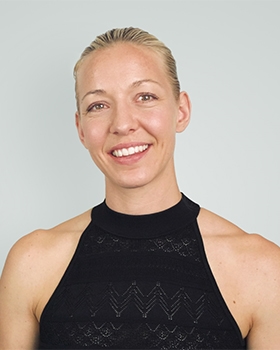 Heidi Davis: There are 440 million women going through the menopausal transition worldwide and 330 million of these women will experience symptoms that are negatively affecting their lives at work and at home. We know that about 60% of women that suffer from their symptoms will seek medical help, but only 30% of these women will get a diagnosis and treatment plan, leaving 70% of the women wanting help to suffer. The simple reason women do not get a diagnosis and treatment plan easily is that there are no clear diagnostic tests to establish perimenopause. Clinicians rely on self-reported symptoms on the frequency and severity of symptoms to establish perimenopause and prescribe treatment. We are developing a first-of-its-kind wearable biosensor and digital platform that can passively quantify & profile the frequency and severity of menopausal symptoms, providing women and clinicians with the necessary information to diagnose & personalise symptom management.
Heidi Davis: There are 440 million women going through the menopausal transition worldwide and 330 million of these women will experience symptoms that are negatively affecting their lives at work and at home. We know that about 60% of women that suffer from their symptoms will seek medical help, but only 30% of these women will get a diagnosis and treatment plan, leaving 70% of the women wanting help to suffer. The simple reason women do not get a diagnosis and treatment plan easily is that there are no clear diagnostic tests to establish perimenopause. Clinicians rely on self-reported symptoms on the frequency and severity of symptoms to establish perimenopause and prescribe treatment. We are developing a first-of-its-kind wearable biosensor and digital platform that can passively quantify & profile the frequency and severity of menopausal symptoms, providing women and clinicians with the necessary information to diagnose & personalise symptom management.
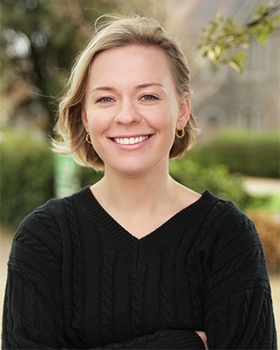 Grainne Byrne: Norma is a psychosexual wellbeing platform and app. Our first product is a digital support programme for two very common conditions that impact sexual wellbeing, vaginismus and dyspareunia, which can affect approximately 1 in 5 in women.* These conditions can cause pain, anxiety, and difficulties with things like penetrative sex, inserting menstrual products, or undergoing a smear test. Our dynamic programme empowers these people with the knowledge and the tools to understand, manage and overcome these conditions at home today. Thankfully, in recent years, there has been a surge of much-needed, user-centric innovations in areas like cycle tracking, fertility, and menopause. At Norma, we are definitely excited to be riding the crest of this long-overdue femtech wave.
Grainne Byrne: Norma is a psychosexual wellbeing platform and app. Our first product is a digital support programme for two very common conditions that impact sexual wellbeing, vaginismus and dyspareunia, which can affect approximately 1 in 5 in women.* These conditions can cause pain, anxiety, and difficulties with things like penetrative sex, inserting menstrual products, or undergoing a smear test. Our dynamic programme empowers these people with the knowledge and the tools to understand, manage and overcome these conditions at home today. Thankfully, in recent years, there has been a surge of much-needed, user-centric innovations in areas like cycle tracking, fertility, and menopause. At Norma, we are definitely excited to be riding the crest of this long-overdue femtech wave.
*When I use the terms “women” or “female” above and below, this acknowledges that we are including individuals who have vaginal/vulvar anatomy but may not identify with those gender labels.
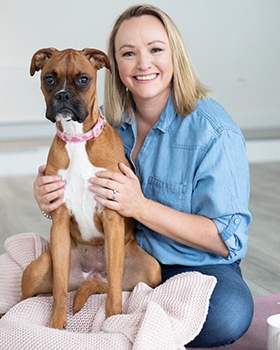 Deborah Brock: Nua Fertility is revolutionising the field of reproductive health by harnessing the power of the microbiome to enhance and optimise fertility outcomes. We combine personal experience, scientific research, and innovative products and digital solutions to optimise the microbiome for fertility success. The idea behind Nua Fertility is one whose time has come as the area of the microbiome for reproductive health is one of the most innovative and growing areas in fertility health. There is a rising awareness of the significant role that the microbiome plays in reproductive health, and scientific advancements have highlighted its impact on various aspects of fertility.
Deborah Brock: Nua Fertility is revolutionising the field of reproductive health by harnessing the power of the microbiome to enhance and optimise fertility outcomes. We combine personal experience, scientific research, and innovative products and digital solutions to optimise the microbiome for fertility success. The idea behind Nua Fertility is one whose time has come as the area of the microbiome for reproductive health is one of the most innovative and growing areas in fertility health. There is a rising awareness of the significant role that the microbiome plays in reproductive health, and scientific advancements have highlighted its impact on various aspects of fertility.
With this increased understanding, individuals and couples are actively seeking effective and holistic approaches to enhance their fertility. They are looking beyond traditional methods and are eager to explore the potential of the microbiome in reproductive health. As pioneers in this field, our startup is at the forefront of this transformative shift, providing individuals and couples with new possibilities for achieving their dreams of parenthood. The time has come for our startup because we are at the forefront of an exciting and rapidly expanding field. By leveraging the power of the microbiome, we are offering innovative products and digital solutions that are backed by scientific rigor and personalised support. We are empowering individuals and couples to take control of their fertility health and explore the untapped potential of the microbiome in fertility.
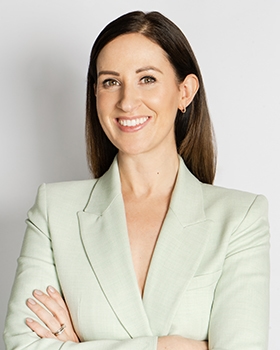 Alison Clarke: Every day, women experiencing fertility problems walk out of their career, resulting in depleted talent pools and costing employers tens of thousands. Fembition is a pioneering women’s fertility and leadership platform for progressive employers who want to retain their top female talent, close the gender gap and build a more inclusive culture at work. Essentially, we provide analytics, networking and peer support for women in business who are experiencing a challenging fertility journey. One of the biggest challenges for many women is managing their career whilst they’re trying to conceive. We work with these women through our platform and provide resources, workshops, and live support.
Alison Clarke: Every day, women experiencing fertility problems walk out of their career, resulting in depleted talent pools and costing employers tens of thousands. Fembition is a pioneering women’s fertility and leadership platform for progressive employers who want to retain their top female talent, close the gender gap and build a more inclusive culture at work. Essentially, we provide analytics, networking and peer support for women in business who are experiencing a challenging fertility journey. One of the biggest challenges for many women is managing their career whilst they’re trying to conceive. We work with these women through our platform and provide resources, workshops, and live support.
Today, employers are more receptive to providing support for women’s health related challenges, as they acknowledge that this has an impact on productivity, performance, and morale. In addition, businesses are under pressure to close the gender gap. Later this year, its anticipated that the EU Pay Transparency Directive will be signed into law, meaning that employers will have the disclose their gap, and their strategy to reduce it. By supporting women’s health-related issues, employers are significantly more likely to retain these employees in the long term.
Question 2: What’s the single biggest lesson you’ve learned since starting your business?
Heidi Davis: Funds are not secured until they are in the bank. Changes can be made up until the final day, and we had exactly that. Changes to the amount being invested etc. at the last minute. These are challenges you can get around, grow from and maybe even be better off with in the long term, but it can feel very disheartening at that moment.
Grainne Byrne: Trusting my instincts has been the most valuable lesson I’ve learned since starting Norma. It’s easy to become overwhelmed by the opinions and reactions of others when you’re launching a new venture or introducing a unique proposition. When I first talked about these conditions, I encountered puzzled looks from people who had never heard of them. This lack of awareness was down to the fact that they have long been under-researched, dismissed and neglected in our society. Many people have suffered in silence for years without the language to talk about these problems, never mind accessing tangible solutions! Having experienced chronic vaginismus myself for over three years, nobody understands the existing barriers to diagnosis, care and information better than I do. Therefore, if you’re building a solution to help solve a problem that you know inside-out, try to filter the feedback you receive and seek out sounding boards that can see the big picture, just like you do.
Deborah Brock: The biggest lesson I’ve learned since starting my business is about resilience. There have been so many ups and downs along the way, but what really stands out to me is the importance of being able to pick yourself back up after those knockbacks and keep pushing forward. You see, being an entrepreneur isn’t always smooth sailing. There are moments when things don’t go as planned, when you face obstacles and setbacks that make you question everything. But it’s in those moments that resilience becomes your superpower. For me, resilience is all about having that fire within me that refuses to let failures define who I am or what I’m capable of. It’s about staying determined and not letting the tough times dampen my spirit. Honestly. there have been many moments when I’ve felt discouraged, but I’ve learned to never lose sight of our mission and the people we are serving.
Our customers are the heart of everything we do. They’re the reason I started this business in the first place. They are the ones who keep me going, even when things get tough. When I have moments of doubt (there have been many), I look up above my desk and I see a smiling Sebastian (Nua baby) with a beautiful handwritten letter from his mum thanking us for creating Nua Fertility as we became part of her journey to bring him into the world- that’s what drives me forward. Resilience has taught me to view challenges as opportunities for growth. Instead of letting setbacks knock me down, I’ve learned to see them as steppingstones on the path to success. Each stumble becomes a chance to learn, adapt, and come back even stronger.
But it’s not just about bouncing back from failure. Resilience is also about maintaining a positive mindset. It’s about staying hopeful, even when things seem bleak. Trust me, there have been moments when I’ve felt overwhelmed and doubted myself, but I’ve learned to approach challenges with a problem-solving attitude. I search for creative solutions, knowing that there’s always a way forward, especially by surrounding yourself with the right people who give you good advice and always listen to those who have been there before and made the mistakes. So, if you’re on this entrepreneurial journey too, remember the power of resilience. Embrace the ups and downs, knowing that they’re all part of the ride. Stay determined, never lose sight of your mission, and keep serving those who rely on you.
Alison Clarke: Always ask for help when you need it. There’s no need to try to figure everything out on your own!
Question 3: What inspires you to keep going despite the challenges women still face in business?
Heidi Davis: Easy, what keeps me going are two things: 1. I have full support from my husband, and he is cheering me on always, on good and bad days. 2. To reduce the challenges that women face we need to continue pushing for change. It is great to be play a minor part of this by persevering and showing up every day to challenge the current ways.
Grainne Byrne: The simple fact that I can see other Irish women entrepreneurs succeeding with their businesses is a huge motivator for me. There is so much power in seeing yourself being represented. As they say, if you can see it, you can be it. Moreover, since I started building Norma, many female entrepreneurs in Ireland have readily and generously given me the time to pick their brain about their individual journeys. It has been so valuable for me to connect with those who are further down the road and have conquered similar challenges. Due to the strong entrepreneurship ecosystem in Ireland, I’ve also been able to develop a phenomenal group of female entrepreneurs that I can luckily call my friends. At the end of the day, being able to support one other through tough times and celebrate our respective wins together is what I find most inspiring.
Deborah Brock: What inspires me to keep going despite the challenges women still face in business is the incredible progress we have made and the potential for even greater change. More women started businesses in 2020 than men, showcasing the determination and resilience of women entrepreneurs! Despite these achievements, women still encounter barriers such as limited funding, gender biases, work-life balance challenges, and lack of support. However, these challenges only fuel my passion to create a more inclusive and equitable business environment. Addressing gender biases requires challenging stereotypes and advocating for equal opportunities. By breaking through patriarchal norms and showcasing our capabilities, we can change the narrative around women in business and create a more inclusive culture.
Despite these challenges, I am inspired by the progress we have made and the potential for further change. By sharing our experiences, raising our voices against biases, and supporting one another, we can bridge the gender gap in entrepreneurship and create a more inclusive and supportive business environment. I am motivated to make an impact and be a source of guidance and support for other women who may be facing similar challenges. By supporting each other, sharing our mistakes and imparting knowledge, we can continue to break barriers, challenge norms, and create a more equitable and empowering business landscape for women entrepreneurs worldwide.
Our work at Nua Fertility focuses on harnessing the power of the microbiome to enhance and optimise fertility outcomes. We are pioneers in this innovative and untapped field, highlighting the significant role the microbiome plays in reproductive health. By leveraging this knowledge, we are providing individuals and couples with new possibilities for bringing life into the world. While setbacks and knockbacks are a part of the journey, the motivation to pick ourselves back up comes from the belief in the transformative impact our work can have. The untapped potential in the field of reproductive health, coupled with our groundbreaking work at Nua Fertility, inspires me to persevere. We are at the forefront of this transformative shift, and by continuing to push boundaries, we can create a positive impact on the overall gender gaps that exist.
Ultimately, our mission is driven by the belief that everyone deserves the opportunity to experience the joy of bringing life into the world. This is what keeps me motivated and determined to overcome obstacles, and it is a constant reminder of the importance of our work at Nua Fertility.
Alison Clarke: It’s expected to take over 130 years to close the gender gap. We all need to play our part. Just 50 years ago it was illegal for women with children to have any type of professional development – it was even illegal to step foot onto the trading floor at the London Stock Exchange. It sounds barbaric, but it wasn’t that long ago. When things get tough, I remind myself that if it wasn’t for the women that advocated for gender equality we’d still be there, and that I too have to play my role to make things better for future generations.
Question 4: What is your number one priority in the next six months?
Heidi Davis: Finalise our product development and raise our seed round.
Grainne Byrne: Without a doubt, our most important objective for the next six months is to launch and rigorously test our MVP. As I come from a consumer research background, staying close to the end user is a non-negotiable for me, as it’s critical that we build Norma to truly fulfil their core needs. Bringing this platform to life is such a gratifying and invigorating challenge, as it’s exactly the lifeline I needed when I was at my lowest with vaginismus. My co-founder, Dr. Natasha Langan, is a dual senior clinical psychologist and a COSRT accredited psychosexual therapist. In her private psychosexual therapy work, she is consistently faced with glaring need for a digital support platform like Norma. Something that collectively drives and excites us is the potential scale of the positive impact we can have on people’s intimate lives, all from the comfort of their own home, wherever that may be.
Deborah Brock: Our number one priority in the next six months is finding the right investor who is a great fit for our company and can support our ambitious growth plans. We are seeking an investor who truly understands the transformative nature of the microbiome-reproductive health connection and recognises the immense potential of our work. Additionally, we aim to highlight the research work we have undertaken with our fertility partner and showcase the remarkable results we are seeing in clinical settings. By sharing these outcomes, we can further establish the credibility and efficacy of our approach.
Finding the right investor who shares our vision and values is crucial for driving our expansion and reaching a wider audience. Their support and resources will enable us to scale our operations, expand our research efforts, and continue making a positive impact in the field of reproductive health. By focusing on securing the right investor and showcasing our research work, we can advance our mission of revolutionising reproductive health through the power of the microbiome.
Alison Clarke: PR is our number one focus. We want to make sure that those who crave the type of service we provide know its available, and that they can access it via their employer.
Our thanks to these four amazing women for their candid thoughts and insights. Find out more about their businesses at identifyher.ai, nuafertility.com, fembition.co, and feelnorma.com.
About the author
 Scarlet Bierman
Scarlet Bierman
Scarlet Bierman is a content consultant, commissioned by Enterprise Ireland to fulfil the role of Editor of the New Frontiers website. She is an expert in designing and executing ethical marketing strategies and passionate about helping businesses to develop a quality online presence.
Recent articles
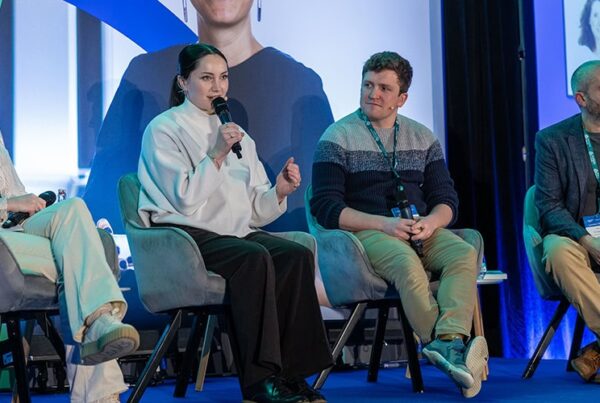
The New Frontiers Programme Connects 158 Founders With Success Stories

Raise Your Startup’s Visibility & Credibility By Entering These Competitions

Founder Perspectives: Lessons From Building Businesses In Sustainability

Tech Startups In The Age Of AI: Alumnus Paul Savage On Speed, Quality & Risk
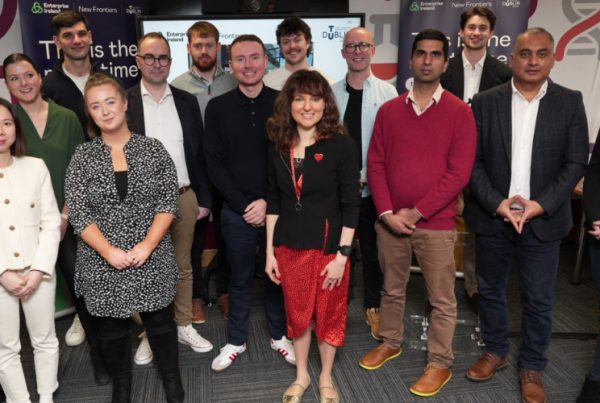
Fourteen Startup Founders Graduate From Phase 2 Of New Frontiers In Tallaght
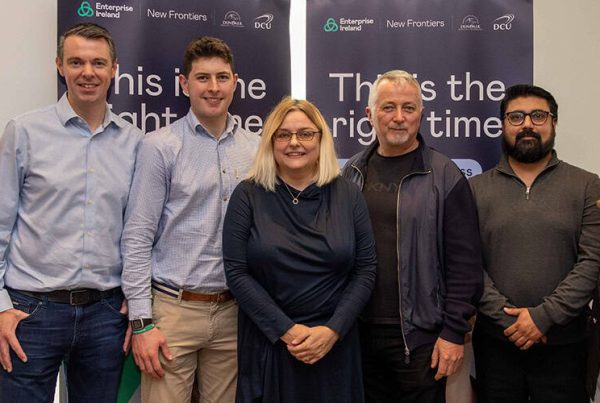
Eleven Founders Graduate From New Frontiers In The Border Mid-East Region

Laying The Right Groundwork Helps Startups Prepare For Export Success
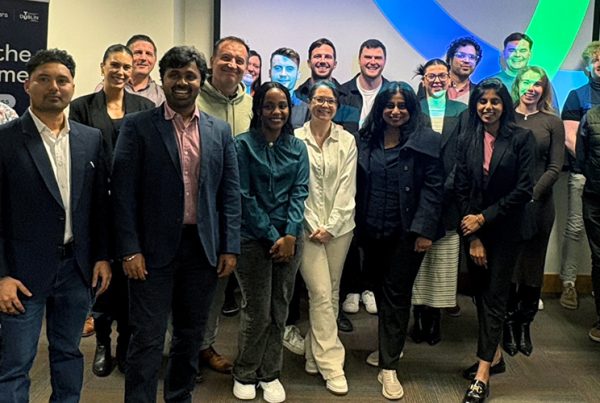
 Scarlet Bierman
Scarlet Bierman
